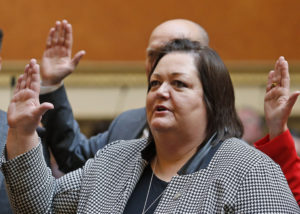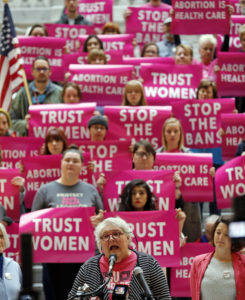HB136 and the anti-abortion push in Utah
Author: Lilian Whitney
-, Lilian Whitney, et al. “HB136 And the Anti-Abortion Push in Utah.” The Daily Universe, 18 June 2019, universe.byu.edu/2019/06/07/hb-136-and-the-pro-choice-push-in-utah/.
The operator doesn’t mention abortion when you call the Planned Parenthood Salt Lake Health Center.
“Thank you for calling Planned Parenthood … you do not need an appointment for pregnancy tests, emergency contraception and HIV testing.”
Several hundred, if not more, of the women who underwent the 2,923 abortions in Utah in 2017 likely listened to the same message before visiting one of the two Planned Parenthood clinics in Utah that offer abortion services.
2019 has been eventful for anti-abortion organizations across the US, and with the passing of Utah HB136 amidst numerous states’ anti-abortion laws, many Utahns are evaluating their stance on abortion.
Life after abortion
Mary Taylor said she doesn’t remember if she was 19 or 20 when she underwent an abortion during her 11th week of pregnancy almost 40 years ago. She says she only remembers it as a dark and painful time.
Taylor said she was raised in a liberal family and assumed that abortion was the natural choice to make when she became pregnant unexpectedly. Uneasy about the decision, Taylor visited a Planned Parenthood facility to learn about her options.
Taylor said a Planned Parenthood counselor told her the abortion procedure wouldn’t remove a baby, but would instead “remove a clump of cells the size of a pencil point.”
Taylor said the counselor urged her to have the abortion completed that very afternoon, warning that waiting would increase the cost of the procedure and likelihood of health complications.
As a result, Taylor said she underwent an abortion during a vulnerable and difficult time and the experience plagued her for years.
During her second pregnancy, Taylor said she read books tracking her baby’s development. At 11 weeks, Taylor read about her developing child’s heart, brain and movements. Taylor said she thought of the 11-week-old fetus she had given up years ago and realized she had been misinformed.
“Was the counselor inept? Was she trying to mislead me? These questions plagued me for years and years. It was painful and dark,” Taylor said.
Taylor’s experience led her to join pro-life groups and to found Pro-Life Utah four years ago. Taylor now works to combat the misinformation she received as a young woman.
Taylor said she has learned through working with countless young women that her experience wasn’t unique. Every year, she said, several thousand young women enter the two Utah abortion clinics in Salt Lake City and receive the same message she did: abortion is not killing and removing a baby from their body.
Utah legislation
With the signing of Missouri’s eight-week abortion ban and Louisiana’s six-week ban, a total of 27 abortion bans have now been enacted across 12 states in 2019. Between January 1, 2011, and May 31, 2019, 479 abortion restrictions were enacted in 33 states, accounting for more than a third of the 1,271 abortion restrictions enacted since Roe v. Wade was decided in 1973, according to the Guttmacher Institute.
States are fighting to create stronger anti-abortion laws with anti-abortion advocates optimistic about challenging Roe v. Wade before the new conservative majority on the U.S. Supreme Court.
In Utah, one of these leaders is Rep. Cheryl Acton, R-West Jordan, who sponsored HB136 in the 2019 Utah Legislative Session. The bill restricts abortions performed after 18 weeks, but is not being enforced pending the outcome of a lawsuit by Planned Parenthood and the ACLU.

Acton was approached by Pro-Life Utah President Mary Taylor and Utah Eagle Forum President Gayle Ruzicka in October 2018. The anti-abortion leaders asked Acton if she would be interested in sponsoring a bill limiting abortion to 15 weeks.
“When approached about sponsoring the bill, I considered it for a few days. The more I thought about it, the more I realized this is life and death, and then I threw myself into it. The more I learned, the more I wanted to do as much as possible for the pro-life cause,” Acton said in an interview in May.
Utah law previously limited abortion to 22 weeks, the point at which a fetus is considered viable, or able to survive outside the womb. Acton’s push for HB 136 focused on pain caused to unborn fetuses and the mental health of women who undergo abortions.
“From the outset, I was determined to present the bill as reasonably as possible. I want people to be convinced based on the facts and reason,” Acton said. “The bill provides every reasonable accommodation and relies on medical advances. Eighteen weeks is the length of an NFL football season — that’s a reasonable amount of time to make an abortion decision.”
Acton’s bill will ban only a small fraction of abortions in Utah. Only 73 of the 2,923 abortions conducted in 2017 were for pregnancies past 18 weeks, according to Utah Vital Statistics. Acton said she views her bill as a reasonable restriction that she hopes will lead to future restriction of all elective abortions in Utah.
“I definitely think someday (Roe v. Wade) will be reversed, and I hope that day will be sooner than later,” Acton said.
Acton said she would like to see abortion laws return to what they were like in 1973.
“Medical advances in what we now know about the physical, emotional and fertility health of a mother, the dismemberment procedure used and fetal pain perception — all of these things should be taken into account when considering Roe v. Wade. Internationally, most countries limit abortion to the first trimester,” Acton said.

Utah passed similar legislation banning abortion after 20 weeks in 1991, legislation that was overturned by an appeals court after being challenged by Planned Parenthood and ACLU.
Marina Lowe, a member of the Legislative and Policy Counsel for ACLU of Utah, said Acton’s bill denies decades of judicial rulings.
“HB136 interferes with a woman’s most personal medical decisions and violates fundamental constitutional principles that courts have repeatedly affirmed,” Lowe said in an ACLU of Utah press release. “The decision to continue or end a pregnancy is one that must be made by a woman in consultation with those she trusts, including her physician, family and faith leaders.”
A 2018 Utah Policy Poll found that 52% of Utahns believe abortion should be illegal in most cases, and 8% believe abortion should be illegal in all cases.
These numbers align with Utah demographics, where 55% of Utahns are members of The Church of Jesus Christ of Latter-day Saints, 13% are Protestant and 5% are Catholics. Utah also has a birthrate 25% higher than the U.S. average.





0 General Document comments
0 Sentence and Paragraph comments
0 Image and Video comments
Although she thinks it has to do with the abortion itself, Taylor felt uneasy and guilty about her decision because she felt like she was pushed into getting the abortion she didn’t want. You will feel that guilty, bad feeling no matter if you get an abortion or not if you don’t feel like you made the right choice for yourself
New Conversation
Hide Full Comment
Most scientists and medical professionals will agree that abortion is not killing a baby. They are not misinforming the public, and for Taylor to claim they are just perpetuating the misconceptions about abortion.
New Conversation
Hide Full Comment
The government can’t claim that they are making this abortion ban because of women’s mental health. The ONLY thing that affects a woman’s mental health is feeling as though she does not have the choice in the matter of her own body.
New Conversation
Hide Full Comment
This will not decrease the number of abortions, it will only increase the number of unsafe abortions. If someone truly wanted to decrease the number of abortions, they would push for comprehensive sex education and free forms of birth control.
New Conversation
Hide Full Comment
General Document Comments 0

